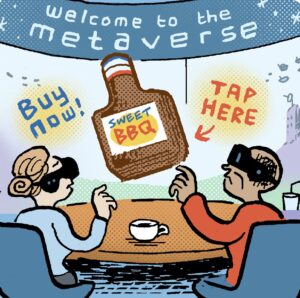 Here’s today’s AdExchanger.com news round-up… Want it by email? Sign up here.
Here’s today’s AdExchanger.com news round-up… Want it by email? Sign up here.
Case In Point
AT&T and the Justice Department released pre-trial briefings outlining their respective arguments for and against the telco’s merger with Time Warner. The trial, which begins next week, could set important new precedents as legacy cable operators and entertainment studios make their case for consolidation in the face of rising competition from comparatively under-regulated technology companies. The case “is about making Time Warner and AT&T more competitive during a revolutionary transformation that is occurring in the video programming marketplace,” according to AT&T. The notion of a “video programming marketplace” may seem like empty legalese, but the convergence of Hollywood-style entertainment (and linear TV marketing budgets) with social and streaming content is crucial to AT&T’s defense. Variety has more.
Feed The Beast
BuzzFeed earned its first programmatic dollar last summer when it opened some display inventory to Google AdX and Facebook Audience Network. Last week it expanded programmatic buying to “the entire sales team to start having those conversations across more than just trading desks, across more than just agencies, going direct to clients,” Chief Revenue Officer Lee Brown tells Digiday. The company is ramping up its ad tech, with Ads.txt-certified vendors AppNexus, Index Exchange, Teads, OpenX, Rubicon Project and Kargo. “Our core business is still native,” Brown says, citing the company’s long-time bread-and-butter sponsored content revenue. But building and targeting BuzzFeed-branded audience segments based on interests (a cash cow product with social media platforms) is too tempting not to pursue. More.
Lean On Media
Snapchat changed its advertising policy so publishers in the app’s Discover section can integrate branded content. Discover has been a decent revenue generator for media partners, but it needs to find another gear if it wants grow mind share among both advertisers and publishers. Discover “continues to have a reputation as a place where ads struggle to hold users’ eyes for more than a second,” writes Garett Sloane for AdAge. Many of the top media companies in Snapchat Discover already have agency-style studios for branded campaigns, and clearly have made a decent argument that they can help Snapchat’s ads perform better and cost more. More.
But Wait, There’s More!
- Facebook Tests AR Tied To Real-World Location Markers – TechCrunch
- Video Ad Fraud, Measurement A Major Concern – eMarketer
- Facebook Is Spying On You, Just Not Through A Phone Mic – WSJ
- CB Insights: Amazon Strategy Teardown – release
- Can Machine Learning Stop Malware? Maybe Not. – BoingBoing
- WFA: Major Brands Taking New Steps In Ad Pricing Audits – release
- Google And Apple In A Race To Buy Promising AI – VentureBeat
You’re Hired!












